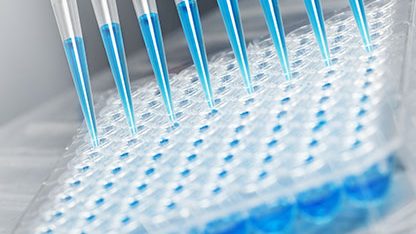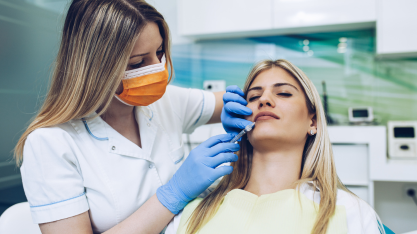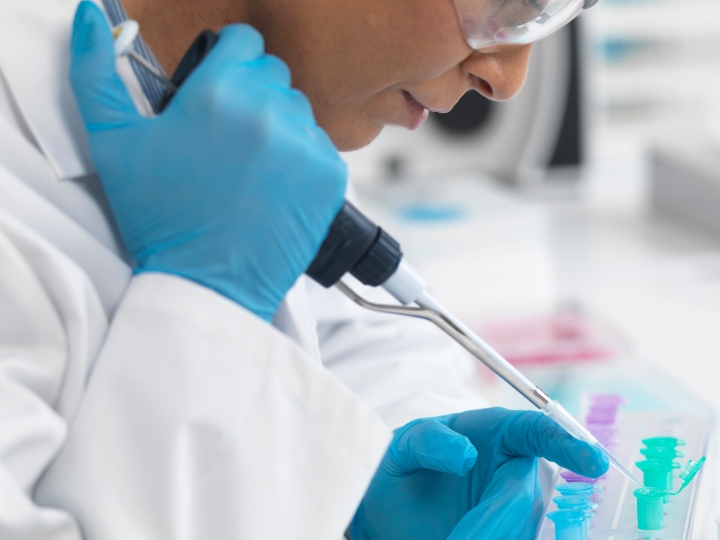Hyaluronic acid testing laboratory including quantification in products to ensure quantity, purity, physico-chemical properties, chemical composition and microbiological properties
Hyaluronic acid (HA) testing is critical to the development of new injectable soft tissue fillers, wrinkle-filling gels, cosmetics and medical devices. Hyaluronic acid in skincare is becoming a popular active ingredient dedicated to the prevention of skin ageing, such as visco-supplements. HA is also used in medical applications such as ophthalmic liquids, parenteral administration drugs, nasal sprays, aerosol applications and tissue scaffolds.
Understanding the quantity, purity, physicochemical properties, chemical composition, and microbiological properties of HA is critical to supporting research and development, as well as monitoring the quality of raw materials and production processes. Our hyaluronic acid analytical testing lab provides a complete set of analytical testing and microbiological lab services to help you characterise and ensure the quality of your HA materials and formulated products. We also provide method development and validation, stability studies at controlled temperature and humidity and extractable and leachable studies.
For over 10 years, our laboratory teams in France (ISO 9001) and the UK have developed and validated analytical methods, performing a unique suite of analytical services for the control of raw materials and finished products based on hyaluronic acid. We are experienced in applying advanced analytics such as capillary electrophoresis for complex biomolecules like HA. We develop and perform analysis in accordance with ISO standards, the EU Cosmetics Reg. 1223/2009, and global medical device and pharmaceutical standards. Bringing quality and safety to life, we offer Total Quality Assurance expertise to help you meet and exceed quality, safety and regulatory standards for your HA products.
Testing Capabilities Summary:
- Chemical Composition: Hyaluronic Acid Assay (quantitative), BDDE residuals, residual solvents, heavy metals
- Physico‑Chemical Analysis: pH, osmolarity, viscosity, molecular weight
- Microbiology: Total viable count, challenge testing (ISO 11930), endotoxin, E.Ph 2.6.14, ISO 16212, ISO 21149, ISO 11731
- Analytical Methods: HPLC, GC-MS, GC‑MS/MS, LC‑MS/MS, ICP-OES, ELISA
- Advanced Analytics: capillary electrophoresis and method development/validation
- Packaging Testing: Cosmetics packaging testing for safety and compliance
QC Testing Services for Hyaluronic Acid in Skincare and Medical Devices
Our scientists offer a range of chemical, biochemical, microbiological and physicochemical testing services to aid your quality control ensuring the production of high-quality products that meet both regulatory and consumer expectations for safety and efficacy. Following the European Pharmacopoeia Monograph, we can evaluate your HA products for:
(i) appearance, shape, colour;
(ii) identification/confirmation of structure;
(iii) assay describing the stability;
(iv) impurities describing the presence of organic volatile impurities and particulate matter, water content, protein content, residual chemicals, heavy metals (by ICP-OES), residual solvent testing for hyaluronic acid, degradation products (quantified by gas chromatography (GC-MS)).
We also provide testing to determine physico-chemical properties, such as pH, osmolarity, viscosity, and particle size. Complementary expertise can help determine the identity, quantity, and purity of formulation ingredients including vitamins, amino acids, and others.
Dosage/Concentration of Hyaluronic Acid
We perform hyaluronic acid quantification assays to the determine HA concentration in samples using different quantitative methods, including a chemical method inspired by the Eur Ph monograph and an enzyme-linked immunoassay technique (ELISA) according to our internal method. Our experienced scientists can readily overcome any challenges presented by product viscosity and dilution requirements and perform method development and verification tailored to your specific product characteristics.
Determination of 1,4-butanediol diglycidyl ether (BDDE)
BDDE is the crosslinking agent used to stabilise most hyaluronic acid fillers. It a significant impact on the physical and functional properties of the finished product and the degradation of BDDE over time can produce a number of nonreactive by-products. Our scientists can determine the trace levels of residual unreacted BDDE in dermal fillers to help you meet the safety risk assessment expectations of regulatory authorities.
Determination of Lidocaine Hydrochloride and Impurities
Lidocaine hydrochloride is a local anaesthetic used in HA formulations. We determine levels of lidocaine and its common impurities.
Endotoxin & Bioburden Testing of HA Raw Materials
We conduct bacterial endotoxin testing to detect or quantify bacterial endotoxin of Gram-negative bacterial origin as per the European Pharmacopoeia 2.6.14 as part of our quality control suite of services. Our microbiology team also provides bioburden testing, supporting hyaluronic acid production according to ISO 11731-1, to help clients evaluate sterilisation processes, monitor control of raw materials, components, and manufacturing processes.
Microbiological Total Viable Count Analysis
To ensure product quality and safety for consumers, we assist producers of HA products through experience microbiological testing for quantification and detection of bacteria present in the products according to ISO 21149:2017. We can also perform quantification of yeast and mould present according to ISO 16212:2017.
Raw Materials Quality Control Testing
We offer a range of HA purity analysis lab services for raw materials supporting quality control testing services from one-off testing to comprehensive ongoing programs to determine and monitor the identity, purity and quality of raw materials and also to monitor the impurities to demonstrate that they are present at levels in compliance with regulatory expectations. Raw materials testing solutions are available for Hyaluronic Acid, BDDE, Lidocaine Hydrochloride, Vitamins, Peptides and more.
Molecular Weight & Physical Properties Determination
Hyaluronic acid molecular weight testing and determination of viscosity look at two key parameters in the clinical performance i.e. perceived feel and persistence) and function of HA materials. The degree of cross-linking of the polymer, microstructure and rheological behaviour (i.e. flow characteristics as a function of shear rate, stress, and previous deformation history) will all have an impact. Our Research and Development laboratories also provide robust mechanical and rheological testing.
Packaging Interaction Studies
We offer science-led cosmetics packaging testing to ensure safety, regulatory compliance, and sustainability, with over 30 years of expertise. From chemical migration and NIAS analysis to recycled material validation, our advanced testing and regulatory support help brands meet evolving requirements to understand product/container compatibility and interactions, migration and leaching of potentially harmful substances.




